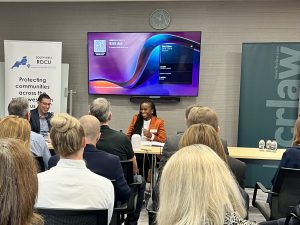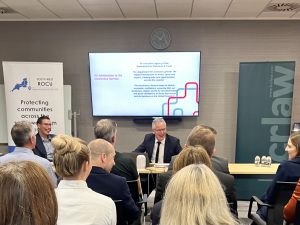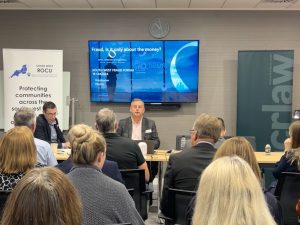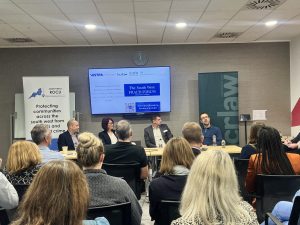South West Fraud Forum Autumn Workshop Round-Up
On 16 October 2024, SWFF members and invitees braved the rain to travel to VISTRA’s stunning Bristol office for a morning at the SWFF Autumn Workshop.
The workshop was chaired by SWFF board member and Partner at HCR Law, Adam Finch.
Attendees heard from speakers from the Serious Fraud Office (UK), The Insolvency Service, and Opus Pear Tree Forensic Accounting, and from a panel comprising of:
- Dr Nic Ryder, Professor of Law at the University of Cardiff
- Dr Diana Johnson, Senior LLB Lecturer at the University of West England
- Andrew Gregory, Group Director of Cyber and Information Security at Ramboll
- Ben Hay, Managing Associate in Commercial Litigation at Foot Anstey
- Chaired by James Gliddon, Partner in Commercial Litigation at Foot Anstey
Our keynote speaker for the day was Olutobi Odetoyinbo (Tobi), Associate General Counsel for the Serious Fraud Office (UK).

Olutobi Odetoyinbo (Tobi), Associate General Counsel for the Serious Fraud Office (UK)
Entitled “A Renewed Focus on the Prevention of Fraud: ECCTA 23”, Tobi gave the attendees a summary of the Economic Crime and Corporate Transparency Act 2023 (ECCTA 23), with a focus on the introduction of the offence of “failure to prevent fraud”. Tobi initially discussed the relevance of this new offence to the SFO’s ability to act in accordance with its objective to “protect the UK’s reputation as a safe place to do business” and hold corporations liable for economic crimes committed for their benefit.
Tobi considered the use of the word ‘reasonable’ in the defence available for s.199, and whether ‘adequate’ prevention procedures would be sufficient. She also discussed the threshold of what would constitute a “large organisation” under this section, and the intended benefit requirement.
The identification doctrine (s196) was the next topic in Tobi’s presentation, considering whether a company would be guilty of an offence where a senior manager acting within the “actual or apparent scope of their authority” commits one of the specified economic crime offences. Tobi also made reference to situations where this would apply even where the employee behaving fraudulently made the organisation itself the victim of the fraud.
Tobi summarised with her thoughts on corporate accountability and fraud prevention moving forwards, and offered the attendees suggested practical steps organisations may take to avoid the offence of “failure to prevent fraud”.

Mark Stephens, Chief Investigator with The Insolvency Service
Up next was Mark Stephens, Chief Investigator with The Insolvency Service, who provided his insight into the 105 (!) new Companies House offences.
Mark highlighted the important work that The Insolvency Service do as Official Receivers in bankruptcy and compulsory liquidation situations. Also to their regulation of Insolvency Practitioners, the work they do to affect policy and legal changes in the sector, and the civil and criminal investigations.
Mark provided the attendees with an insight into the work of the Insolvency Service criminal enforcement team to deter fraud in companies and by bankrupt individuals, and the prosecutions they bring for breach of Insolvency and Company law.
Mark then discussed the recent Companies House reforms, setting out the 105 new offences it introduces, and who has responsibility for prosecuting each offence – the Insolvency Service or Companies House.
This talk concluded with a case study on the multiple crime types being perpetrated by shell companies controlled by Sinocentric OCG’s, of which 58,000 have been identified by the Intelligence Analysis.
Opus Pear Tree Forensic Accounting
We then heard from Robert Brooker, Director at Opus Pear Tree Forensic Accounting, who spoke on the impact of fraud outside of financial loss.

Robert Brooker, Director at Opus Pear Tree Forensic Accounting
Robert’s talk initially discussed why fraud is consistently recognised as “The Growth Industry”, bringing the attendees attention to a book published with this title in 1988 which addresses many of the same problems we face today. He referenced the impact of the shift to online and digital payments and wider advances in technology, the effect of economic uncertainty and fragmented financial systems, and the underreporting of fraud cases enabling many fraudsters to continue their activities with many failing to understand the full scale of the issue.
Attendees were then encouraged to profile famous fraudsters and recognise the key traits they hold, including their ability to deceive and impersonate, coerce and exploit, and the recklessness of their actions. With this image fresh in attendees’ minds, Robert then moved onto the impact that fraud can have on people.
This thought provoking discussion looked at the emotional impact fraud can have on an individual or a business, when they suffer damage to their financial situation, environment, reputation, or their confidence and security. The attendees considered the mental impact on a fraud victim after the incident – the shock and shame, loss of confidence, increased anxiety and isolation, and the effect that all of this may have on their physical health.
Panel Discussion

Prof. Nic Ryder, Dr Diana Johnson, Andrew Gregory, and Ben Hay
To wrap the day up, James Gliddon hosted a dynamic panel comprising of Prof. Nic Ryder, Dr Diana Johnson, Andrew Gregory, and Ben Hay – who offered their different perspectives on how businesses can ensure compliance with the new fraud prevention requirements.
Conclusion
The second conference from the SWFF this year provided
With the day including speakers from such a variety of different professional backgrounds, roles and viewpoints on the sector, it offered a fantastic opportunity for attendees to understand the balance between adhering to the academic interpretation of the recent legislative changes, the realities of fraud prevention in practice both for international companies and those enforcing the regulations, and the advice available to assist with both preventing fraud and responding effectively when fraud has occurred.



